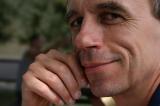Coartata scientia iucunda non est. (Hugo of St.-Victor/Leonard Boyle O.P.)
Io sono una forza del Passato. / Solo nella tradizione è il mio amore. / Vengo dai ruderi, dalle chiese, / dalle pale d'altare, dai borghi / ... / E io, feto adulto, mi aggiro / più moderno di ogni moderno / a cercare fratelli che non sono più. (Pier Paolo Pasolini)
---
Wim Verbaal, professor Latijnse taal en literatuur, universiteit Gent, verantwoordelijk voor de Scientific Research Network Literature without Borders, voormalig voorzitter van het Henri Pirenne Instituut voor Middeleeuwse Studies, lid van het International Medieval Latin Committee en van redactiecommissies bij Corpus Christianorum, Sacris Erudiri en Toronto Medieval Texts.
Zijn onderzoek omvat de Latijnse poëtica en haar ontwikkeling binnen de middeleeuwse literatuur. Verder publiceert hij over het kosmopolitisme van de Latijnse literatuur als Europese literatuur in middeleeuwen en moderne tijden, over de poëtica van kosmopolitische literaturen en over ontstaan en impact van het klassieke paradigma op modern Europa. Bovendien is hij actief vertaler uit het Latijn en publiceert hij over de problematike van het vertalen uit kosmopolitische talen.
---
Wim Verbaal, professor of Latin language and literature, Ghent University, responsible for the Scientific Research Network Literature without Borders, former president of the Henri Pirenne Institute for Medieval Studies, member of the International Medieval Latin Committee and of editorial committees at Corpus Christianorum, Sacris Erudiri and Toronto Medieval Texts.
His research includes Latin poetics and its development within medieval literature. He also publishes on the cosmopolitanism of Latin literature as European literature in medieval and modern times, on the poetics of cosmopolitan literatures, and on the emergence and impact of the classical paradigm on modern Europe. Moreover, he is an active translator from Latin and publishes on the problems of translating from cosmopolitan languages.
---
For a full and updated Bibliography, see: https://ugent.academia.edu/WimVerbaal.
